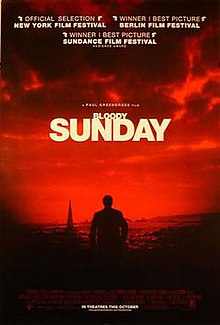Bloody Sunday (film)
| Bloody Sunday | |
|---|---|
 Film poster | |
| Directed by | Paul Greengrass |
| Written by | Paul Greengrass |
| Produced by | Mark Redhead |
| Starring | James Nesbitt Allan Gildea Gerard Crossan |
| Cinematography | Ivan Strasburg |
| Edited by | Clare Douglas |
| Music by | Dominic Muldowney |
Production companies | Bórd Scannán na hÉireann Granada Television Hell's Kitchen Films Irish Film Board (funding) Portman Entertainment Group |
| Distributed by | Paramount Classics |
Release dates |
|
Running time | 105 minutes |
| Country | Ireland |
| Language | English |
| Budget | £2,000,000 |
| Box office | £482,117 |
Bloody Sunday is a 2002 film about the 1972 "Bloody Sunday" shootings in Derry, Northern Ireland. Although produced by Granada Television as a TV film, it premiered at the Sundance Film Festival on 16 January, a few days before its screening on ITV on 20 January, and then in selected London cinemas from 25 January. The production was written and directed by Paul Greengrass. Though set in Derry, the film was actually shot in Ballymun in North Dublin. However, some location scenes were shot in Derry, in Guildhall Square and in Creggan on the actual route of the march in 1972.
Content
The movie was inspired by Don Mullan's politically influential book Eyewitness Bloody Sunday (Wolfhound Press, 1997). The drama shows the events of the day through the eyes of Ivan Cooper, a SDLP Member of the Parliament of Northern Ireland who was a central organiser of the Northern Ireland Civil Rights Association march in Derry on 30 January 1972. The march ended when British Army paratroopers fired on the demonstrators, killing thirteen and wounding another who died 4½ months later.
The soundtrack contains only one piece of music, a live version of "Sunday Bloody Sunday" by U2 which plays over the closing credits.
Casting and production
Cooper is played by James Nesbitt, himself a Protestant from Northern Ireland. In recognition of the role his book played in achieving the new Bloody Sunday Inquiry, his book's role as inspiration for the movie, and the fact that he was a schoolboy witness to the tragedy, Don Mullan was asked by director Paul Greengrass to appear in the film as a Bogside Priest. A number of the military characters were played by ex-members of the British Army, including Simon Mann. Gerry Donaghy was played by Declan Duddy, nephew of Jackie Duddy, one of those killed on Bloody Sunday. Big Brother 2007 (UK) housemate Seány O'Kane was in the film also.[1]
Notable actors
- James Nesbitt as Ivan Cooper
- Simon Mann as Col Derek Wilford
- Tim Pigott-Smith as Major General Robert Ford
- Nicholas Farrell as Brigadier Patrick Maclellan
- Allan Gildea as Kevin McCorry
- Gerard Crossan as Eamonn McCann
- Mary Moulds as Bernadette Devlin
- Carmel McCallion as Bridget Bond
- David Clayton Rogers as Dennis
Reception
The film was critically acclaimed.[2] It won the Audience Award at Sundance and the Golden Bear at the Berlin International Film Festival (tied with Spirited Away), in addition to the Hitchcock d'Or best film prize at the Dinard Festival of British Cinema.[3]
Bloody Sunday appeared a week before Jimmy McGovern's TV film on the same subject, entitled Sunday (shown by Channel 4). McGovern subsequently criticised Greengrass's film for concentrating on the leadership of the march, and not the perspective of those who joined it.[4]
It holds a 92% approval rating on aggregate review site Rotten Tomatoes, based on 102 collected reviews, with an average score of 7.9/10. The site's consensus reads: "Bloody Sunday powerfully recreates the events of that day with startling immediacy."[5]
References
- ^ Seány O'Kane at IMDb
- ^ UKTV Drama Stars Archived 30 September 2007 at the Wayback Machine uktv.co.uk. Retrieved 14 July 2007.
- ^ French award for Bloody Sunday BBC News Online, 6 October 2002. Retrieved 14 July 2007.
- ^ McGovern, Jimmy (10 June 2004). "The power of truth". The Guardian. London.
- ^ "Bloody Sunday (2002)". Flixster. Retrieved 22 February 2014.
Further reading
- Blaney, Aileen (Fall–Winter 2007). "Remembering Historical Trauma in Paul Greengrass's Bloody Sunday". History & Memory. 19 (2). Indiana University Press: 113–138. doi:10.2979/HIS.2007.19.2.113.
External links
- Use dmy dates from November 2012
- 2002 films
- 2000s drama films
- 2002 television films
- British television films
- Docudramas
- Films directed by Paul Greengrass
- Irish drama films
- Irish films
- Irish television films
- ITV television programmes
- Paramount Vantage films
- British drama films
- British films
- Films set in Northern Ireland
- Films about The Troubles (Northern Ireland)
- Golden Bear winners
